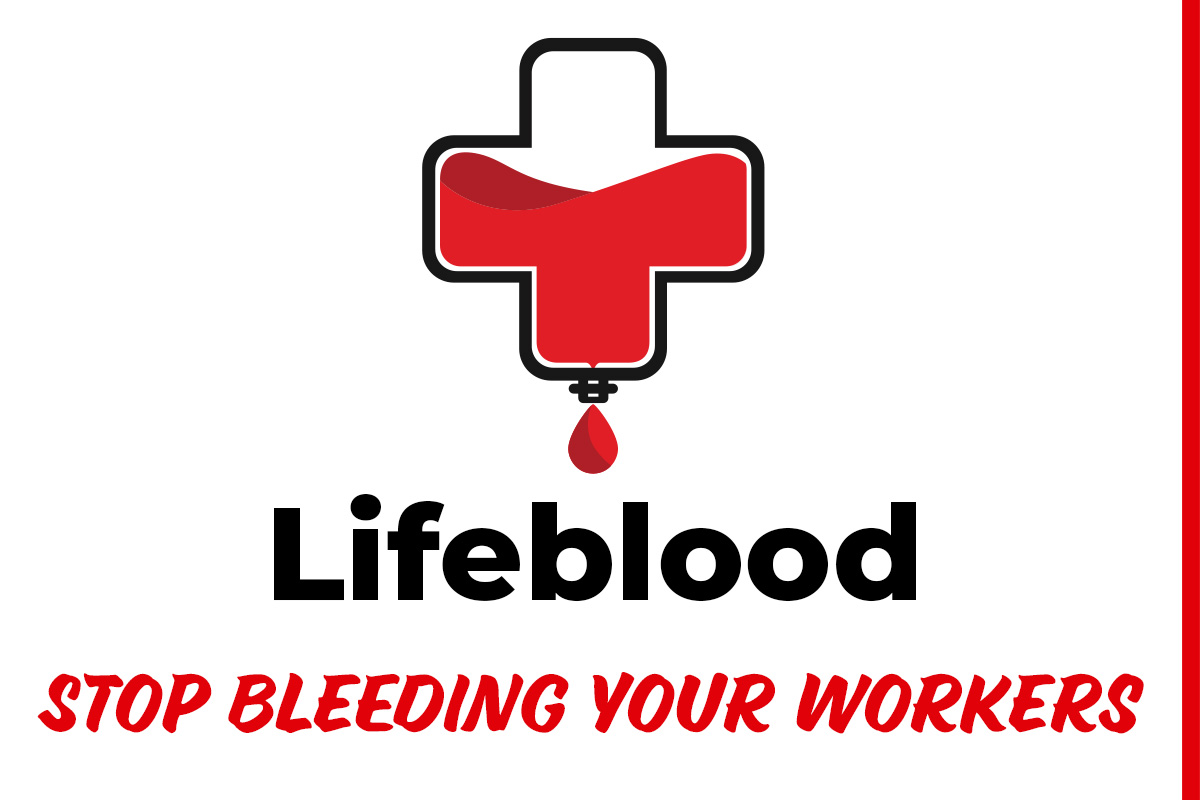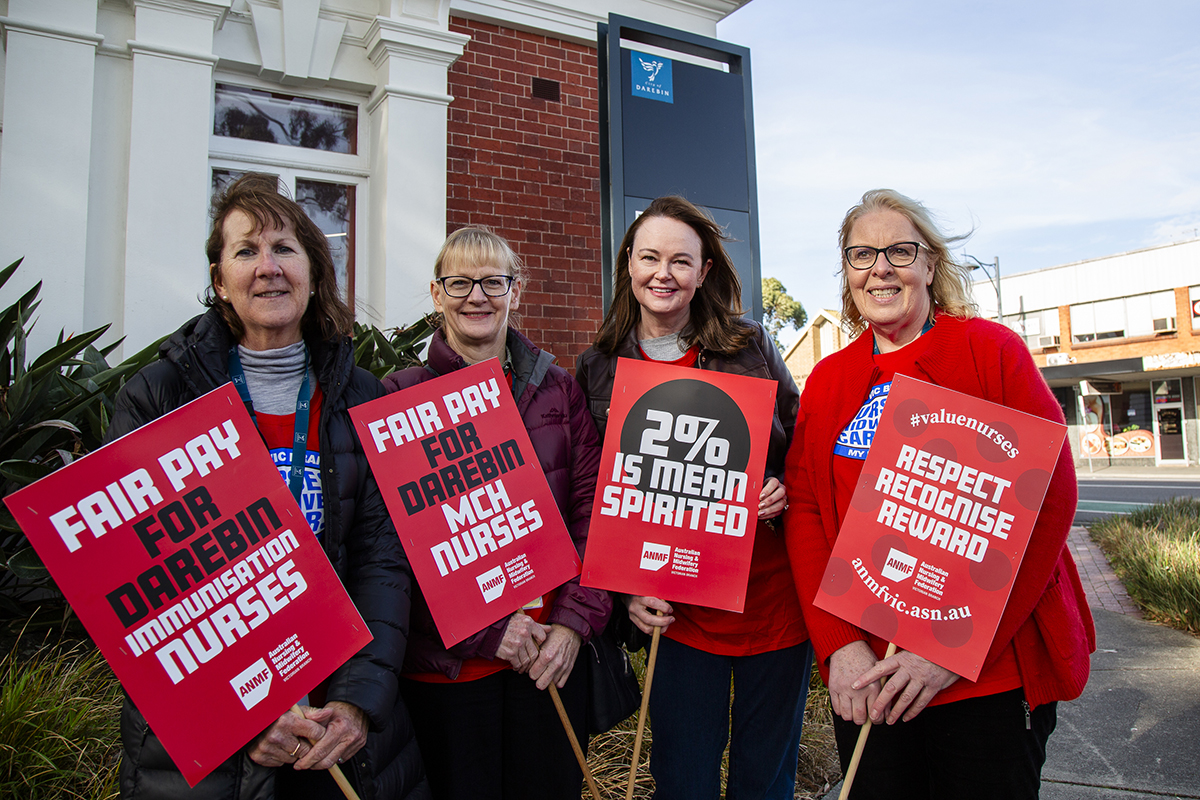
[This article was updated on 2 November 2023. We originally incorrectly reported that Lifeblood’s current wage offer was 8% in the first full pay period after the vote. The correct wage offer is 3.8%. We originally reported that Lifeblood’s current wage offer in the first full pay period after 1 November 2025 was 3%. The correct wage offer is 2.5%.]
ANMF (Vic Branch) members at Australian Red Cross Lifeblood and DonateLife Victoria, along with ANMF Lifeblood members nationally, have been bargaining for improved terms and conditions for almost a year. Negotiations have not progressed satisfactorily, and members are now preparing for possible industrial action.
The Victorian and Tasmanian Lifeblood enterprise agreement expired in December 2022. ANMF (Vic Branch) had been seeking to meet with Lifeblood since late 2022 ahead of the expiry date, with each attempt met with push-back and delays. Other states had been negotiating since early 2022 and these were also challenging. Finally in May 2023 Lifeblood told ANMF officials and members that it would be seeking a national agreement.
Previously, Lifeblood members negotiated their enterprise agreements state by state as well as the Territories. This meant that all Lifeblood employees have different rates of pay and for Victorian employees, some greater entitlements – for example, more annual leave, morning shift allowances, overtime for part-timers and a Victorian-only skill-mix provision to ensure the safety of staff and donors.
Under Lifeblood’s proposed national agreement, Victorian members stand to lose most of these benefits. Members in other states are also facing a reduction in terms and conditions.
ANMF held its first ever national members’ meeting in September, and surveyed Lifeblood members in early October to gauge support for their employer’s offer. Overwhelmingly, members do not believe the employer proposed agreement reflects Lifeblood’s stated desire to be an employer of choice, and the bargaining process has left them feeling that their employer does not value them.
‘The entire negotiations have affected all staff negatively,’ said one, summing up the general consensus, ‘and they have really tarnished Lifeblood’s reputation.’
‘I no longer feel cared for by Lifeblood,’ said another member. ‘If the EBA continues to be so poor, I fear we will lose a lot of staff.’
Members’ concerns cover several areas, with specific focus on pay, increment freezes and rostering.
Victoria-specific losses
The proposed agreement would see Lifeblood members in Victoria lose:
- the existing state agreement’s skill-mix provision, which provides safe staffing levels. The proposed agreement effectively gives Lifeblood the capacity reduce the role and number of RNs on each shift.
- accident make-up pay for those members receiving WorkCover weekly payments
- a disciplinary clause that enshrines dispute resolution procedures to resolve employee grievances.
DonateLife Victoria members have called for their qualifications allowances to be aligned with Victorian Public Sector entitlements, as they are required to hold postgraduate qualifications to perform their unique roles in providing organ donation services.
Victorian members also reject Lifeblood’s proposal to be able to withhold 100 per cent of annual salary increases to employees undergoing performance management.
National losses affecting all members
Pay
Nationally ANMF had made a claim for 7 per cent per annum, or the value of CPI, whichever is greater. Lifeblood’s current wage offer stands at:
- 3.8% first full pay period after the vote
- 3% first full pay period on or after 1 November 2024
- 2.5% first full pay period on or after 1 November 2025
Other proposed pay matters of concern to members include:
- shift allowances that won’t apply on weekends and public holidays.
Increments/experience
Members have rejected the proposed compression of increments and freeze on progression between sub-levels.
Under the proposed agreement, an RN at increment 3 stands to lose up to $9000 in projected salary as they are not able to progress to an upper sublevel. An EN at increment 3 stands to lose out on more than $2500 in the same circumstances. These losses become compounded over the life of future agreements, given there is no opportunity for those on the lower sublevels to progress to the upper sublevels.
Rostering
Rostering, and Lifeblood’s proposed plan to change the length of an ordinary shift to between four and 10 hours – down from six and 10 hours – is another major sticking point for members. ‘Minimum four-hour shifts are not acceptable,’ said one member. Meanwhile, single days off between shifts leave members with no work-life balance.
Next steps
On 15 October, ANMF officials met with Lifeblood members from around the country to discuss the cuts to conditions by state and territory. At this meeting, members voted to authorise ANMF to prepare a bargaining dispute application – including the ability to take protected industrial action – with the Fair Work Commission if key member concerns are not satisfactorily resolved with Lifeblood.
A follow-up meeting between the Branch and Lifeblood on 20 October resulted in some gains, with Lifeblood agreeing to not pursue the abolition of two existing member entitlements – retention of the morning shift allowance and payment of overtime for part-time workers after 7.6 hours – but not others.
ANMF will continue to meet with Lifeblood to seek fair entitlements for members, who remain prepared for protected industrial action.
To stay up to date, make sure your contact details are correct on the member portal; if you are not receiving On the Record and eNews each month, you may need to resubscribe.




